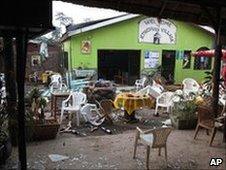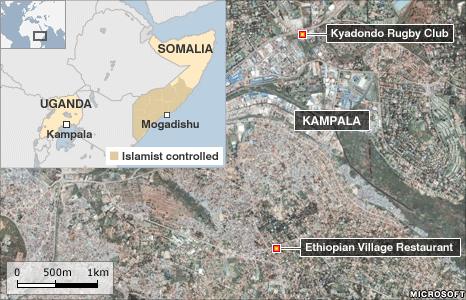Uganda's World Cup joy shattered by blasts
- Published
Panic, chaos and despair followed the twin blasts which cast a dark cloud upon Kampala's experience of Africa's first World Cup.
Women were wailing hysterically, with some even doing the unimaginable, like foolhardily running across a road darting between the fast-moving vehicles. They said they no longer cared if they got hit by a car.
Sandra Akidi who had lost three family members in one of the blasts said she saw no more reason to live. "How could I lose three people at the same time?" she asked, crying.
Casualty figures after the blasts at the Kyadondo Rugby Club and the Ethiopian Village restaurant have been rising steadily, with 74 the latest figure.
Ugandan Health Minister James Kakooza says emergency measures have been put in place to cope with patients with different levels of injuries, some of whom are critical.
There are still several casualties lying on the hospital floor, some having only received the basic first aid. A woman looking at them before they were wrapped up in bandages said the sight at the hospital reminded her of a slaughter-house.
"I can't believe what I just saw. I've never seen so many people bleeding so profusely like this, with flesh thus exposed," she said.
Police have cordoned off the scenes of the blasts, and onlookers - some of whom are keen to follow every detail of the aftermath - can only watch from a safe distance, as the hitherto places of merry-making turn into deserted police search areas.
Glee becomes sorrow
At the Kyadondo, where most people died, cars are still parked inside: Some seemingly abandoned and effectively serving as an ominous reminder of the devastation that human savagery visited in that place.

One of the blasts targeted football fans at the Ethiopian Village restaurant
Eyewitnesses say some vehicles could belong to the victims of the blasts or people who had come to look for their relatives.
Blood-stained plastic chairs on which the revellers sat to watch the biggest match in world football are still strewn around the ground.
The excitement of the final match seems to have quickly changed into tragedy.
"We were approaching the end of the game, everyone was quiet, and all of a sudden we heard a blast. Everyone was shocked; others started running. But the majority of the people didn't seem scared when the first blast went off," said Joel Matsiko, who was at the Kyadondo.
"But when the second one came in, that's when people knew that there was something wrong. I remember a lady who was on the stage, and she blew the vuvuzela the loudest, but unfortunately - as I was running out of the scene of the blast - I just saw her down on the floor.
"I think she had a cut on her head, so I just felt sorry for her, but couldn't do anything. From the way she appeared to me, I think she was dead, but can't confirm that she was," Mr Matsiko said.
And as people awoke to the reality of a post-World Cup without dear family members and friends, some wished the tournament had never taken place on African soil, causing so much excitement and then a tragic, shattering turn.
The excitement had quickly been turned into a nation's sorrow - the glee of the beautiful game had been shrouded by fear and distress. That was the anti-climax of Uganda's World Cup experience.
Al-Shabab links
The police say they believe the attacks were well co-ordinated and intended to cause the maximum possible damage as they targeted huge crowds of people watching the match.
And they were quick to say they were not ruling out anything, including the possible involvement of the Somali militant group, al-Shabab.
The Inspector General of Police, Kale Kayihura, said in the immediate aftermath of the blasts that "these seem to have been pre-planted devices, rather than thrown from outside".
"We've sent our teams to check both places, so that we can work backwards and be able to establish what kind of devices, and who could have been behind this. At this stage really we cannot rule out anything - we are open-minded, but obviously this is terrorism. That is clear."
Al-Shabab had previously warned that Uganda and Burundi would pay for the role of their forces in Somalia, where their troops make up the African Union peacekeeping mission in Somalia (Amisom).

- Published12 July 2010
- Published12 July 2010
- Published14 June 2010